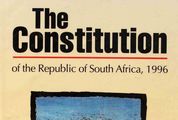Criticism of land rights bill is off target
by Elmien Du Plessis,
2016-02-26 06:04:56.0
VOCAL criticism was levelled against the Expropriation Bill before it was passed by Parliament this week. While it is always good to debate the legal inadequacies of legislation in the making, it is also prudent to ensure irrational fear does not trump reason, and in the process, scare investors away.
Criticism is levelled against the definition of property in the bill that states property is "as contemplated in section 25 of the Constitution". This merely indicates that property has a wider meaning than the private law property concept that mostly restricts property to tangible property. The bill thus leaves the definition of property to the courts.
This check allows enough flexibility for the bill to be relevant in the next few decades (stability), as the concept of property will change if the past 40 years or so are anything to go by. The bill aligns expropriation with the Constitution.
Take another criticised aspect: the definition of expropriation as "compulsory acquisition", as commonly referred to in other jurisdictions, simply means the state acquires property by compulsion, rather than negotiation. Importantly, it is in line with the recent Constitutional Court judgment that when the state "acquires" a right, it amounts to an expropriation.
The 2013 Agri SA Constitutional Court action inspired a third criticism of the bill that it will enable the state to place land in its custodianship, taking it outside the realm of private property without payment of compensation, amounting to "expropriation without compensation".
Careful scrutiny of the majority judgment reveals a finding that the state did not acquire the substance of the right, so on the specific facts, this did not amount to an expropriation. The court was careful to emphasise that it would "be inappropriate to decide definitively that expropriation is in terms of the (act in question) incapable of ever being established". The court did not therefore state categorically that every form of custodianship would meet this criterion.
To interpret it in any other way is problematic and dangerous.
A final criticism of the bill, that it excludes "indirect" or "regulatory" expropriations, also raises unnecessary ire. Indirect expropriation is not recognised under the act. Thus far, the Constitutional Court has been extremely wary of introducing it into the South African landscape, specifically because it causes much confusion in American expropriation jurisprudence. Such a view is, therefore, untenable.
Some changes should even be welcomed. The bill allows for the expropriating authority to serve a notice of intention to expropriate. The owner of the property can then make representations as to just and equitable compensation. If the state were to accept it, it would technically not amount to an expropriation, but a negotiated settlement (albeit with the threat of expropriation). If the state rejects the representations, it must provide details and supporting documents to indicate an amount it is willing to offer. Only when no agreement is reached is an actual expropriation notice served and can the expropriation process commence.
As with the 1975 act, the notice of expropriation puts in place a procedure, in line with our administrative law rules and principles, that gives the owner adequate time to respond to the notice and argue the amount that is claimed. Should the state go ahead with the expropriation without an agreement on compensation, the aggrieved party still has recourse to the courts, as before under the 1975 act and as guaranteed in the Constitution.
If anything, the bill will not speed up land reform. It does not give the state more powers than it already has. While expropriation is an important tool to acquire land for reform, land-reform programmes are governed by separate legislation such as the Restitution of Land Rights Act and depend on efficient policy implementation for its expeditiousness.
• Du Plessis is an associate professor of law at the University of North West. She specialises, among others, in expropriation law

If anything, the bill will not speed up land reform. It does not give the state more powers than it already has, says the writer. Picture: THINKSTOCK
VOCAL criticism was levelled against the Expropriation Bill before it was passed by Parliament this week. While it is always good to debate the legal inadequacies of legislation in the making, it is also prudent to ensure irrational fear does not trump reason, and in the process, scare investors away.
Criticism is levelled against the definition of property in the bill that states property is "as contemplated in section 25 of the Constitution". This merely indicates that property has a wider meaning than the private law property concept that mostly restricts property to tangible property. The bill thus leaves the definition of property to the courts.
This check allows enough flexibility for the bill to be relevant in the next few decades (stability), as the concept of property will change if the past 40 years or so are anything to go by. The bill aligns expropriation with the Constitution.
Take another criticised aspect: the definition of expropriation as "compulsory acquisition", as commonly referred to in other jurisdictions, simply means the state acquires property by compulsion, rather than negotiation. Importantly, it is in line with the recent Constitutional Court judgment that when the state "acquires" a right, it amounts to an expropriation.
The 2013 Agri SA Constitutional Court action inspired a third criticism of the bill that it will enable the state to place land in its custodianship, taking it outside the realm of private property without payment of compensation, amounting to "expropriation without compensation".
Careful scrutiny of the majority judgment reveals a finding that the state did not acquire the substance of the right, so on the specific facts, this did not amount to an expropriation. The court was careful to emphasise that it would "be inappropriate to decide definitively that expropriation is in terms of the (act in question) incapable of ever being established". The court did not therefore state categorically that every form of custodianship would meet this criterion.
To interpret it in any other way is problematic and dangerous.
A final criticism of the bill, that it excludes "indirect" or "regulatory" expropriations, also raises unnecessary ire. Indirect expropriation is not recognised under the act. Thus far, the Constitutional Court has been extremely wary of introducing it into the South African landscape, specifically because it causes much confusion in American expropriation jurisprudence. Such a view is, therefore, untenable.
Some changes should even be welcomed. The bill allows for the expropriating authority to serve a notice of intention to expropriate. The owner of the property can then make representations as to just and equitable compensation. If the state were to accept it, it would technically not amount to an expropriation, but a negotiated settlement (albeit with the threat of expropriation). If the state rejects the representations, it must provide details and supporting documents to indicate an amount it is willing to offer. Only when no agreement is reached is an actual expropriation notice served and can the expropriation process commence.
As with the 1975 act, the notice of expropriation puts in place a procedure, in line with our administrative law rules and principles, that gives the owner adequate time to respond to the notice and argue the amount that is claimed. Should the state go ahead with the expropriation without an agreement on compensation, the aggrieved party still has recourse to the courts, as before under the 1975 act and as guaranteed in the Constitution.
If anything, the bill will not speed up land reform. It does not give the state more powers than it already has. While expropriation is an important tool to acquire land for reform, land-reform programmes are governed by separate legislation such as the Restitution of Land Rights Act and depend on efficient policy implementation for its expeditiousness.
• Du Plessis is an associate professor of law at the University of North West. She specialises, among others, in expropriation law























Change: -1.46%
Change: -1.32%
Change: -1.02%
Change: -1.11%
Change: -3.27%
Data supplied by Profile Data
Change: 0.34%
Change: 0.21%
Change: -1.46%
Change: 0.00%
Change: 0.51%
Data supplied by Profile Data
Change: 0.14%
Change: 0.10%
Change: 0.04%
Change: 0.30%
Change: -0.23%
Data supplied by Profile Data
Change: 0.04%
Change: 0.20%
Change: 0.00%
Change: 0.00%
Change: 0.39%
Data supplied by Profile Data